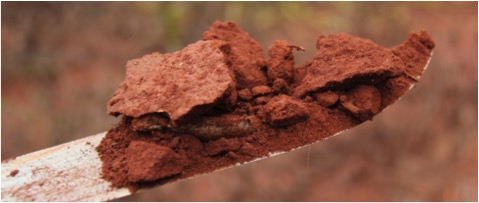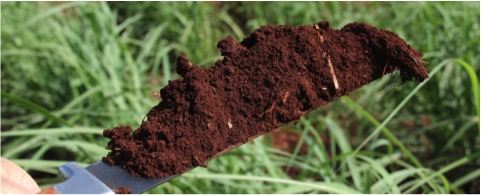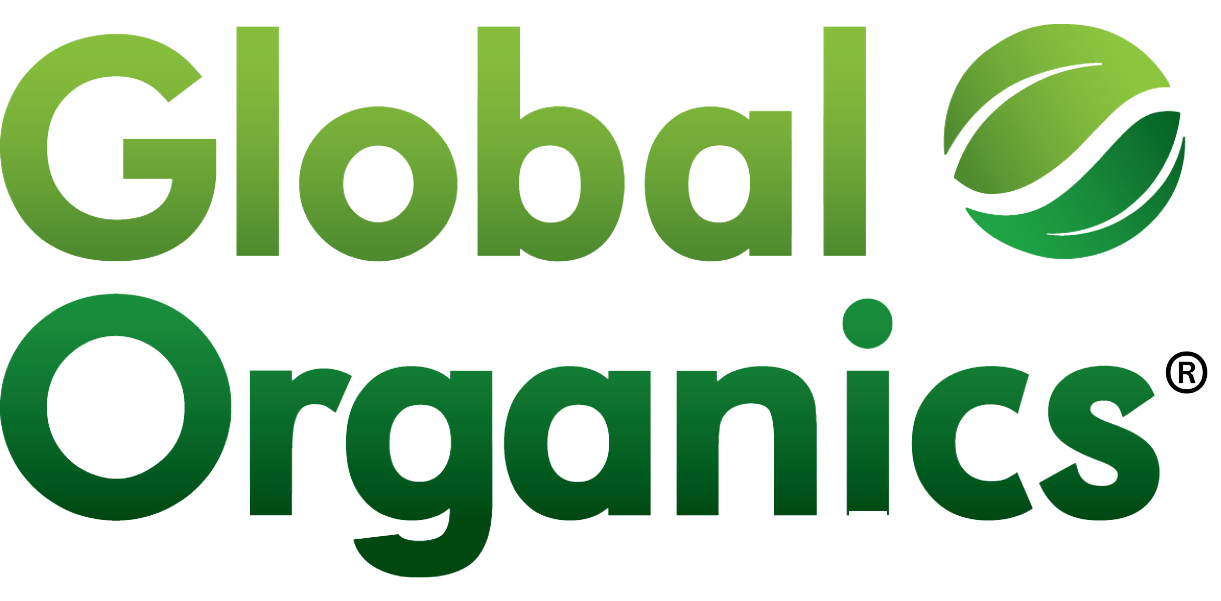Soil before and after ROC farming practices.
Sustaining the Future

Global Organics proudly celebrates its longtime partner, Natíve, as Brazil’s first Regenerative Organic Certified™ Gold sugar producer. For 35 years, Natíve’s Green Cane Project has revolutionized sugarcane farming by prioritizing soil health, biodiversity, sustainability, and social fairness, setting a global standard for sustainable practices.


Fair for Life Projects
Lar Escola Espirita Professor Euripedes Barsanulfo
This project aims to support a volunteer school in Sertãozinho City by providing furniture essential for the operation of its physical school network dedicated to Early Childhood Education. The needed items include tables, chairs, teacher desks, and changing tables for nursery classrooms.
Chico Xavier Spiritualist Association
The Chico Xavier Spiritualist Association in Sertãozinho City is undertaking the construction of a garden with a retaining wall, complete earthworks for the parking lot, and drainage for the entire area, including excavation and the use of BGS stone.
EE Capitao Joel Miranda
The public school “EE Capitão Joel Miranda” in Santa Ernestina City is renovating its reading room, incorporating suitable furniture to create a comfortable, inviting, and welcoming environment.
Associacao Desportiva Educacional E Social De Barrinha
The non-profit organization “ADESB – Associação Desportiva Educacional e Social de Barrinha” in Barrinha City is facilitating the acquisition and donation of sports equipment and complete uniforms to support children and teenagers currently participating in sports activities.
Association for People with Disabilities Assistance
The Volunteer Association for People with Disabilities Assistance (APAE) in Sertãozinho City is undertaking the acquisition and installation of photovoltaic panels to help reduce energy costs.
Nosso Lar
The orphanage “Nosso Lar” in Sertãozinho City is investing in the acquisition and installation of photovoltaic panels to lower energy expenses.
The Barrinha Workers’ Social Development Institute
The Barrinha Workers’ Social Development Institute (IDEST) in Barrinha City is adapting its space by creating a dedicated room for qualification courses, tutoring, and lectures. Additionally, the toy library and IT room are being renovated to enhance the quality of services provided to the community.
LARFID/Lar De Amparo a Crianca Filhous De Deus
The orphanage “LARFID/Lar de Amparo à Criança Filhos de Deus” in Sertãozinho City is constructing a dedicated space for family interactions, providing children and teenagers in care with opportunities for moments of family reintegration.
Albergue Noturno Octavio de Oliveira Campos
The “Albergue Noturno Octávio de Oliveira Campos” free night shelter for the homeless in Sertãozinho City is undergoing renovations, including the modernization of internal bathrooms and the installation of external awnings.
Project Plantando Empreendedoras
The “Plantando Empreendedoras” project (in partnership with SEBRAE) aims to empower women from low-income backgrounds by providing knowledge, promoting healthy eating, and encouraging entrepreneurship through female empowerment.
EmCash Web Platform
The EmCash Web platform offers financial education to help reduce family debt and provides access to credit with subsidized interest rates for both the community and employees.
Fairtrade Projects
Casa Pia Sao Vicente de Paulo "Asilo" Sertazinho
Casa Pia São Vicente de Paulo “Asilo” Sertãozinho focuses on preserving cultural heritage while providing opportunities for new beginnings. Its initiatives aim to revitalize traditions and improve the quality of life for those it serves.
Totalpass
The Totalpass app offers subsidized plans for employees and their families, providing access to workout training at partner gyms. It also promotes physical exercise and healthy eating habits to enhance overall health and longevity.


Chocolate

Fairtrade Projects
Peru
Fairtrade projects focus on training cooperatives on child labor and implementing the HREDD social compliance system. This involves consulting young people in Fairtrade communities about education and work. The funds also improve cocoa productivity, provide technical assistance, and support environmental and social development.
Dominican Republic
Premiums are invested in infrastructure development, such as roads, energy facilities, housing, and community buildings. They also contribute to rural electrification and improve access through the construction of a bridge.
Coconut
Fairtrade & Sustainability
Indonesia
Sustainability Project Initiatives: Organic coconut nectar sources have the lowest environmental impact, high productivity, and minimal inputs. It reduces fuelwood consumption and forest loss by 8.6x, leading to a significant reduction in biomass fuel. The goal is to offset the carbon footprint through rainforest conservation and land regeneration, while promoting farm biodiversity and reducing inefficient processing.
Farmer Fairness Programs: Our coconut nectar supplier has ensured that farmers earn more than 300% the local government minimum wage, launched a debt reduction program, and implemented various training programs to improve livelihoods. Moving forward, their goals include providing clean water access, offering scholarships for climbers’ children, promoting improved livelihoods through organic crops, establishing a cooperative climbers bank, implementing retirement savings, and providing health and accident insurance.
Sri Lanka
Farmer Fairness Programs: Our supply partner ensures the purchase of 100% of their monthly coconut production at an organic premium. Employment opportunities are provided to the entire family. A free healthcare program is offered to farmers and their families. Farmers have free access to grazing land. The purchase of cattle milk production is guaranteed. Residential facilities are provided for farmers on-site.
Community Development Projects: Aim to enhance accessibility to properties through infrastructure improvement. They also involve the rehabilitation of village water storage tanks and the construction of tube wells and agro wells. Additionally, smallholder farmers are offered training programs to increase productivity and acquire the necessary knowledge for sustainable organic farming.
Sustainability Initiatives: The Soil Conservation Project implements measures like grass cover, cover crops, stone terraces, and drains to prevent topsoil erosion and soil salination. The Biodiversity Projects focus on inter-cropping, integrated farming systems, multi-layering root systems, and biological pest control to increase biodiversity and improve soil microbiology. The Water Management Project employs techniques such as mulching, rainwater harvesting, micro-irrigation, and linear trenches. The Air Conservation Project prohibits the burning of waste materials and plastic, while the Energy Efficiency Project utilizes coconut shells and solar panels for energy production. The No Coconut Wastage Project ensures all parts of the coconut are utilized, and the Water Recycling Project treats and recycles liquid waste for reuse in agricultural lands.
India
Our supply partner is dedicated to social accountability, renewable energy, and environmentally sustainable practices, including solar energy, zero waste, and fair trade farming. They prioritize renewable energy, water resources, zero waste to landfill, and effective food waste management as crucial aspects of their operations.


Fairtrade & Sustainability
Indonesia
Sustainability Project Initiatives: Organic coconut nectar sources have the lowest environmental impact, high productivity, and minimal inputs. It reduces fuelwood consumption and forest loss by 8.6x, leading to a significant reduction in biomass fuel. The goal is to offset the carbon footprint through rainforest conservation and land regeneration, while promoting farm biodiversity and reducing inefficient processing.
Farmer Fairness Programs: Our coconut nectar supplier has ensured that farmers earn more than 300% the local government minimum wage, launched a debt reduction program, and implemented various training programs to improve livelihoods. Moving forward, their goals include providing clean water access, offering scholarships for climbers’ children, promoting improved livelihoods through organic crops, establishing a cooperative climbers bank, implementing retirement savings, and providing health and accident insurance.
Sri Lanka
Farmer Fairness Programs: Our supply partner ensures the purchase of 100% of their monthly coconut production at an organic premium. Employment opportunities are provided to the entire family. A free healthcare program is offered to farmers and their families. Farmers have free access to grazing land. The purchase of cattle milk production is guaranteed. Residential facilities are provided for farmers on-site.
Community Development Projects: Aim to enhance accessibility to properties through infrastructure improvement. They also involve the rehabilitation of village water storage tanks and the construction of tube wells and agro wells. Additionally, smallholder farmers are offered training programs to increase productivity and acquire the necessary knowledge for sustainable organic farming.
Sustainability Initiatives: The Soil Conservation Project implements measures like grass cover, cover crops, stone terraces, and drains to prevent topsoil erosion and soil salination. The Biodiversity Projects focus on inter-cropping, integrated farming systems, multi-layering root systems, and biological pest control to increase biodiversity and improve soil microbiology. The Water Management Project employs techniques such as mulching, rainwater harvesting, micro-irrigation, and linear trenches. The Air Conservation Project prohibits the burning of waste materials and plastic, while the Energy Efficiency Project utilizes coconut shells and solar panels for energy production. The No Coconut Wastage Project ensures all parts of the coconut are utilized, and the Water Recycling Project treats and recycles liquid waste for reuse in agricultural lands.
India
Our supply partner is dedicated to social accountability, renewable energy, and environmentally sustainable practices, including solar energy, zero waste, and fair trade farming. They prioritize renewable energy, water resources, zero waste to landfill, and effective food waste management as crucial aspects of their operations.
Fruits &
Vegetables

Sustainability Projects
Various Regions
Companies actively monitor air quality to prevent contamination, focusing on analyzing fixed emission sources such as boilers and electric generators. Waste management is approached comprehensively, prioritizing reduction, reuse, and recycling while ensuring hazardous waste is handled by a qualified manager to prevent soil contamination. Additionally, companies are committed to the integral care and preservation of flora and fauna in surrounding external areas.
Rice
Fair Farming Programs
India
Our supply partner’s Fair Farming Program has made a significant impact on over 60,000 individual farm families across 800 villages, improving water sources, sanitation, schools, roads, and community centers, while also supporting women’s empowerment programs. In addition, to protect biodiversity and combat climate change, our partner has planted 40,000 trees, implemented energy-saving devices, and adopted water-saving practices, including a rainwater harvesting system that benefits more than 90 families.
Fair Farming Programs
India
Our supply partner’s Fair Farming Program has made a significant impact on over 60,000 individual farm families across 800 villages, improving water sources, sanitation, schools, roads, and community centers, while also supporting women’s empowerment programs. In addition, to protect biodiversity and combat climate change, our partner has planted 40,000 trees, implemented energy-saving devices, and adopted water-saving practices, including a rainwater harvesting system that benefits more than 90 families.
